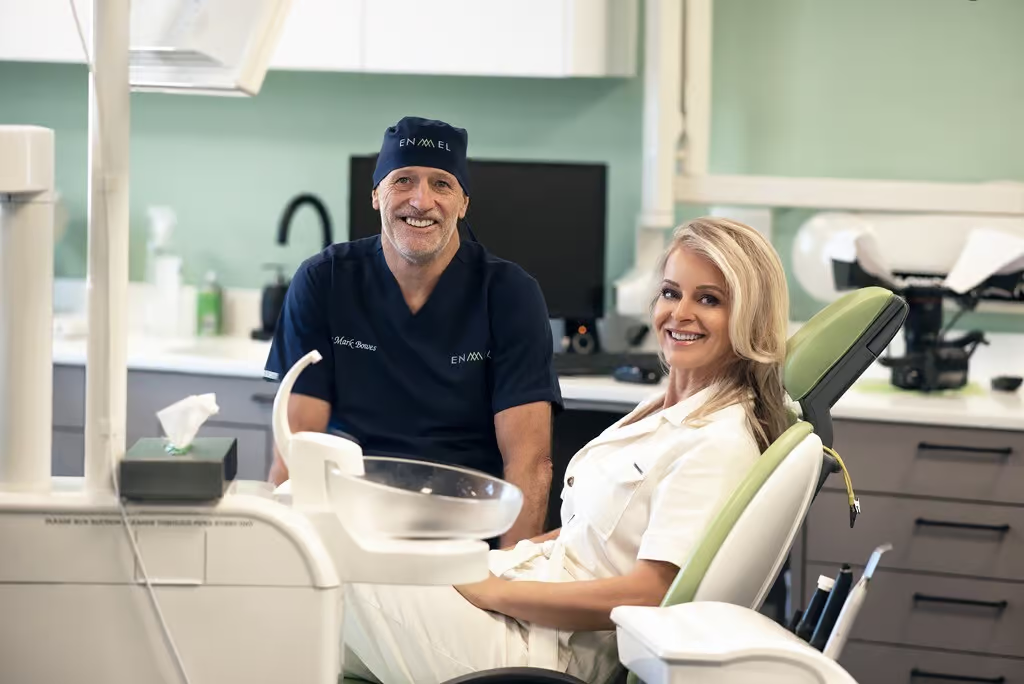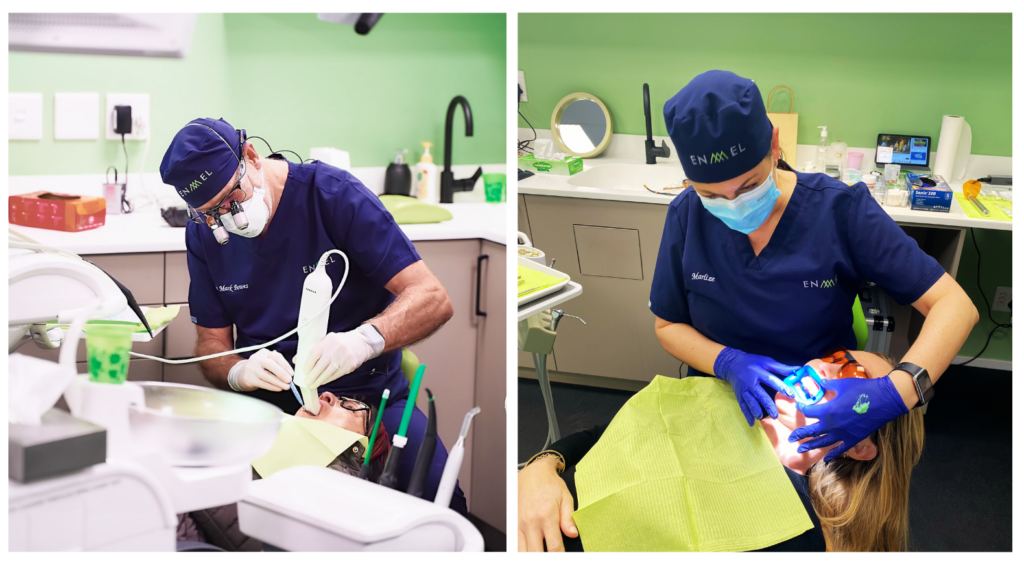One of the surprising side effects of menopause is its effect on your teeth. But many women aren’t aware of the link, and oftentimes, it’s up to dentists to point out the effects and educate their patients on how to deal with them best.
But the hormone-tooth health link isn’t all that mysterious. After all, hormones regulate so much more than a woman’s menstrual cycle. They play a key role in their overall health and well-being, from their moods to their bone health and, of course, their teeth.
Menopause is known to affect the flow of saliva, the skin (oral mucosa) of the mouth, and the teeth and gums. If left unmanaged, poor oral health can have unpleasant effects, like tooth loss and bone degradation. It can even increase the risk of systemic diseases like heart disease and stroke.
Luckily, when working with your dentist, you can prevent many of the complications that could come with menopause. In this blog, we’ll take a look at how this can be achieved.
Hormones & Gum Health
Healthy teeth and gums rely on hormones, since hormones regulate saliva production. Reduced estrogen leads to reduced saliva flow in the mouth, and saliva maintains oral health by neutralising plaque acids, destroying certain bacteria via an antibody system, and washing away any food particles that feed bacteria and allow them to thrive and initiate disease.
Hormones are also important for the maintenance of the mouth’s soft tissue, keeping it healthy and thick. However, menopause leads to the thinning of the soft tissue, which may lead to numerous oral diseases.
When it comes to bone density, menopause can hasten the speed of bone loss, which can lead to osteoporosis. Moreover, periodontal (gum) disease, alongside bone loss in the jaw, can result in receding gums and tooth loss.
Another side effect of low estrogen levels is an increased risk of cavities, which can lead to abscesses or infections, worsening oral health. What’s more, menopause can also lead to depression, which may impact your level of oral care. Increased plaque and calculus buildup may further aggravate the condition of your mouth.
Since various factors are at play, we recommend opting for a multifaceted treatment approach.
Hormone Therapy

Hormone therapy helps replace amounts of estrogen lost, regulating the body from the inside out. And since a large part of oral health is affected by hormones, some women find this treatment method highly beneficial.
Hormone replacement can also help with oral and gum health by regulating saliva production and maintaining one’s bone density. Still, hormone treatment is a controversial topic, despite statistics showing that up to 44 percent of women on hormone replacement therapy see positive oral health results.
Nonetheless, hormone therapy is one part of protecting your oral health during menopause. Women must also work closely with their dentist, who can treat issues as they arise and prevent further complications along the way.
Your Dentist & Your Teeth

To give you an idea of why you should work with your dentist regularly, let’s explore the different side effects the change in hormones has on your gums specifically.
Dry Mouth
Hormones regulate the production of saliva, and during menopause, many women experience dry mouth. Saliva has many functions, including food digestion, buffering of plaque, which reduces tooth decay, and antibacterial action that fights bacteria that cause both tooth decay and gum disease.
The reduction of saliva flow in women with menopause increases the risk of infections, tooth decay, and gum disease. As a result, visiting your dentist for regular, professional cleanings is paramount.
During a check-up, your dentist will inspect, clean, polish, and floss your teeth – ensuring you stay free of disease or other issues like tooth decay and bad breath. During menopause, it’s best to go in for a check-up at least twice a year, and whenever you feel an issue arise, arrange to see your dentist right away.
Sensitive Gums
During this time, gums can get more sensitive and prone to inflammation, and women may experience bleeding gums, swelling, and redness. This is known as “menopausal gingivostomatitis.”
Most gum diseases are painless and therefore go undetected until the disease process is so bad that the teeth have to be removed. It is, therefore, imperative that more regular visits to the oral hygienist and dentists are carried out to ensure problems are picked up early. A three to four month recall is ideal for anyone with a higher risk of any gum disease.
Not attending to potential gum and tooth issues early on can lead to more serious complications. We reiterate that you should visit your dentist regularly so that they can treat any issues as they arise.
Diseases of the Oral Tissues
Menopause leads to a thinning of the skin in the mouth (oral mucosa). This thinning leads to an increased risk of viral, bacterial and fungal infections. It may also lead to an increase in other disease processes that affect this tissue due to its increased permeability. Burning sensations and neurological changes may also take place.
Burning Mouth Syndrome
A less common effect of menopause is burning mouth syndrome. Here, women experience an uncomfortable scalding, burning, or tingling sensation in the mouth. This usually affects the tongue and the lips, and there is nothing that makes it better. BMS is diagnosed once all other potential diseases have been discounted, and the oral tissue usually looks and appears healthy.
Treatments for burning mouth syndrome involve targeting pain, opting for a high-fluid diet, adding in nutritional supplements, and possibly, hormone replacement therapy. Despite the treatment, it is often a difficult disease to manage.
It’s important to have an open and honest conversation with your dentist about all the side effects you’re experiencing, ensuring they’re aware of any current treatment programs. This way, your treatments can work in tangent with one another.
What You Can Do

Balance Out Your Hormones
Treating oral health from the inside out involves taking hormone supplements. This maintains bone density, which decreases the chances of gum recession and tooth loss. Hormonal treatment also encourages saliva production, preventing excessive dryness and bacterial build-up that can lead to gum disease and cavities.
See Your Dentist and Hygienist Regularly
Seek early treatment, and see your dentist often. The more quickly you target issues, the less likely they are to create more painful, complex dental problems that can be costly and uncomfortable.
As many of the disease processes related to menopause are preventable, it is ideal to see your hygienist every three to four months rather than the routine six-monthly visits. This allows them to reduce plaque and calculus buildup, which in turn reduces the risk of decay and gum disease. They can also provide you with fluoride or calcium gel applications during your visit, which will help to further reduce disease.
Lifestyle Changes
Menopause lasts between 10 and 15 years, so maintaining oral health requires lifestyle changes. Brush your teeth twice a day with fluoride toothpaste, floss, and use antibacterial mouthwash.
It’s also highly advisable that you visit your dentist to get your mouth professionally cleaned regularly. Prevent any alcohol-based mouthwashes as they tend to increase the permeability of the already thinned-out oral mucosa and may lead to an intense burning sensation.
Get Professional Dental Care at Enamel Clinic

Treating the oral health side effects of menopause requires a combination of approaches and the expertise of oral medicine specialists, periodontists, dentists, and oral hygienists.
Our experienced team understands this, working together to target your oral health issues from every angle. The result is an integrative approach that uses state-of-the-art technology and modern treatment methods that you can use to complement your wider treatment plan.
At Enamel Clinic, our goal is to make any dental procedure as comfortable and effective as possible. If you’re interested in maintaining optimal oral health during menopause, browse through our service offerings or contact our team to make a booking, and we’ll guide you through your next steps.

